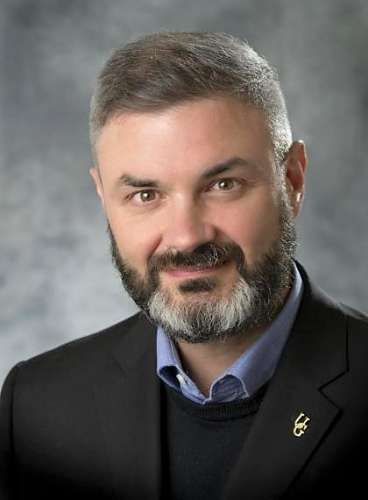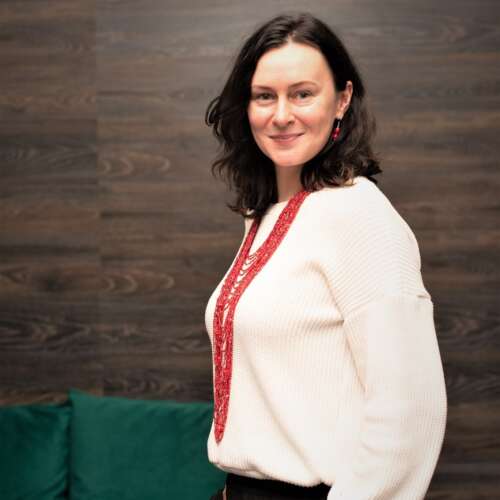The University of Guelph is the first post-secondary institution in Canada to twin with a Ukrainian university as part of a new international partnership program announced today.
Under the agreement, Ukrainian students and faculty from Dnipro State Agrarian and Economic University (DSAEU) will be able to continue their learning, work and research by partnering with U of G staff and faculty.
Dr. Charlotte Yates, U of G president, took part in this morning’s online signing of the memorandum of understanding (MOU). She was joined by officials at DSAEU in eastern Ukraine.
“This partnership is a testament to the unrelenting power of higher education and the profound courage of the students, staff and faculty of Dnipro State Agrarian and Economic University,” said Yates. “I want the students, staff and faculty of DSAEU to know that this MOU represents the beginning of a long-term commitment with the University of Guelph to collaborating on impactful academic and research endeavours.”
Marking its centenary this year, DSAEU is home to about 8,000 students and 500 faculty. Located in the city of Dnipro, it is less than 150 kilometres from the front line of the war with Russia.
The MOU establishes academic and research ties between the twinned schools.
The historic event – occurring even as Ukrainian forces continue to battle Russian troops – is part of a broader international effort. In the U.K., more than 20 universities have twinned with counterparts in Ukraine.
Today’s global online event included the heads of those universities in England, Scotland and Ukraine.
Partnership to help avoid Ukrainian ‘brain drain,’ assist in post-war recovery
“We’re proud to be the first to partner with our Ukrainian colleagues,” said Dr. Stuart McCook, assistant vice-president (international), adding that other Canadian universities are likely to follow U of G’s lead.

He said that under the agreement with DSAEU, U of G researchers and students will explore potential academic and research exchanges and knowledge-sharing, partly to help Ukraine avoid a “brain drain” and to help the country recover from the impacts of the war.
McCook said more than 40 U of G faculty members have expressed interest in potential exchanges and research partnerships. He also said Ukrainian graduate students and senior undergrads may begin visiting Guelph as soon as fall 2022 for research training to help them complete their degrees at DSAEU.
Although it’s too early to pinpoint details about joint projects involving U of G and DSAEU, McCook said: “There are a lot of U of G faculty, staff and administrators who want to do something to help. When the war broke out, we didn’t have a focus. This partnership now gives us that focus.
“The major benefit of this twinning partnership is that we get to build concrete relationships with people in Ukraine. We’ll be able to help in very important and impactful ways. Our first step is to let them take the lead on what they need from us immediately.”
He said DSAEU is an ideal twin for U of G. It has strong programs in animal and veterinary sciences as well as engineering, all longstanding strengths of U of G. Early discussions about the partnership have involved leaders from U of G’s Ontario Veterinary College, Ontario Agricultural College and the College of Engineering and Physical Sciences.
Twinning a long-term partnership for U of G and DSAEU
McCook said that while the strain of the war can be seen on the faces of his Ukrainian colleagues, he is constantly amazed by “their positivity, creativity, willingness to adapt and overall resilience.”

McCook and his DSAEU counterpart, Dr. Iryna Volovyk, both stressed the need to continue this partnership beyond the war’s conclusion.
“For our University, it’s very important to keep doing academic and research activities despite the war and all the difficulties,” said Dr. Volovyk.
“We want to support our students and faculty in their moving ahead with plans – and dreams – and we are sure that it is our contribution to the victory of Ukraine. We want to work together with U of G. We want to learn how to improve our education programs and are ready to share our experience. We are very grateful to feel needed and valued today and tomorrow.”
She added: “We have already started the development for our cooperation road map. From meeting to meeting, we are finding more joint topics of interest – in water and agricultural engineering, aquaculture, agronomy, veterinary medicine, and agribusiness.
“We appreciate this long-term partnership with U of G – a very modern, innovative and open to collaboration university. We’re happy that our ideas for future projects are being considered and collaboration has already started. The energy of U of G’s willingness to support us – we can feel that from thousands of miles away.”
Partnership reflects U of G research strengths, strategic internationalization goal
The twinning initiative was spearheaded by the U.K.-based Cormack Consultancy Group, which matches universities worldwide with shared research and academic interests. Since last fall, McCook and other U of G officials have discussed potential partnership opportunities in other countries with the organization.
After war broke out in Ukraine, the agency invited U of G to consider taking part in a new twinning program focused on universities in the European country.
McCook said this new initiative reflects U of G’s strategic goals, including fostering internationalization.
Referring to a new global engagement plan he recently presented to the U of G Senate, he said: “I think the University is in the process of reimagining how it wants to be in the world. This partnership, and our involvement in Ukraine, is an early example of how we engage with the world in new ways.”
He added: “There are so many challenges in the world, it can be hard to know which ones to focus on and how we can help as a U of G community. This is one moment where we knew we could make a difference to people and a university halfway around the world who are also in the middle of a war.”
During a video call last week with students at nearly a dozen Canadian universities, Ukrainian President Volodymyr Zelenskyy thanked Canadian institutions for hosting Ukrainian students, and called on those students to return following their studies to help rebuild the country.
“We’re grateful to have an opportunity to help make a difference in the world and especially in Ukraine,” said McCook. “To be able to participate in supporting our Ukrainian colleagues through this war as well as help them rebuild a healthy, prosperous and peaceful Ukraine afterwards is a tremendous honour.”
For Ukrainians, Dr. Volovyk said: “It’s very important to be members of the world community and share with other nations the values of freedom, tolerance, solidarity and respect for other cultures and traditions. During the war, it’s also important to show our staff and students that we have partners, friends – old and new ones – who stand with us. This twinning project has created a link between DSAEU and U of G that will last many years. Our joint research and academic projects will create a space to get to know each other better and to move ahead together.”
Contact:
Dr. Stuart McCook
avpi@uoguelph.ca
